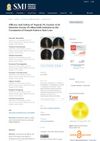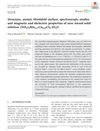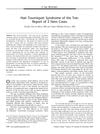 December 2023 in “Siriraj Medical Journal”
December 2023 in “Siriraj Medical Journal” 5% Azelaic acid is as effective as 2% Minoxidil for female pattern hair loss and could be an alternative for those allergic to Minoxidil or pregnant.
 July 2023 in “The journal of investigative dermatology/Journal of investigative dermatology”
July 2023 in “The journal of investigative dermatology/Journal of investigative dermatology” Assessing CD8+ T cell levels before surgery may improve vitiligo treatment outcomes.
[object Object] September 2022 in “Health and Medical Journal” Minoxidil and oral antioxidants helped improve hair growth in a patient with hair loss due to lupus.
 November 2021 in “Research Outreach”
November 2021 in “Research Outreach” Low testosterone levels may lead to more severe COVID-19 outcomes.
 November 2021 in “Research Square (Research Square)”
November 2021 in “Research Square (Research Square)” The research found that COVID-19 survivors experienced long-term effects like anemia and hypertension, with age and gender being important factors, but race, income, and education had little to no impact.
May 2021 in “American journal of medical sciences and medicine” Sodium valproate caused vomiting in 20% of children under 2 years old, with other side effects like hair loss and loss of appetite also noted.
 December 2019 in “Mehmet Akif Ersoy Üniversitesi Sağlık Bilimleri Enstitüsü dergisi”
December 2019 in “Mehmet Akif Ersoy Üniversitesi Sağlık Bilimleri Enstitüsü dergisi” One cat with low thyroid hormone had growth issues, and another with high thyroid hormone had skin problems; both got better with treatment.
 January 2019 in “Applied Organometallic Chemistry”
January 2019 in “Applied Organometallic Chemistry” The compound (NH4)2Mn0.17Cu0.83Cl4.2H₂O has a specific structure, shows weak magnetism at low temperatures, and undergoes phase changes at high temperatures.
 April 2017 in “Australasian Journal of Dermatology”
April 2017 in “Australasian Journal of Dermatology” The session covered updates on skin treatments, including radiotherapy, imiquimod, acitretin, JAK inhibitors, and strategies for managing rosacea and preventing surgical infections.
September 2014 in “Tehran University Medical Journal TUMS Publications” September 2008 in “Pediatric Rheumatology” Two children with lysinuric protein intolerance showed symptoms similar to lupus.
November 2006 in “Yafteh” March 2005 in “Hair transplant forum international”  February 2022 in “Journal of Cosmetic Dermatology”
February 2022 in “Journal of Cosmetic Dermatology” Using both minoxidil and flutamide together is more effective for treating hair loss than using minoxidil alone.
January 2013 in “The Nishinihon Jourrnal of Dermatology”  391 citations,
November 2015 in “Journal of Clinical Lipidology”
391 citations,
November 2015 in “Journal of Clinical Lipidology” The guidelines suggest lifestyle changes, diet adjustments, and personalized medication to manage dyslipidemia and reduce heart disease risk.
 43 citations,
August 2010 in “Expert Opinion on Investigational Drugs”
43 citations,
August 2010 in “Expert Opinion on Investigational Drugs” Inhibitors of 11β-HSD1 show potential for treating type 2 diabetes but require more testing for safety and effectiveness.
23 citations,
October 2008 in “Journal of medicinal chemistry” PF-998425 is a new, effective, and non-phototoxic treatment for skin conditions related to androgens.
 22 citations,
June 2018 in “Journal of Neuroinflammation”
22 citations,
June 2018 in “Journal of Neuroinflammation” Procyanidins from grape seeds reduce nerve pain by blocking specific proteins and inflammation.
 17 citations,
December 2009 in “Journal of Pediatric Orthopaedics”
17 citations,
December 2009 in “Journal of Pediatric Orthopaedics” Two babies needed surgery to remove hair tightly wrapped around their toes to prevent serious injury.
17 citations,
July 1977 in “International Journal of Dermatology” Proper shaving techniques and specific topical treatments can help manage pseudofolliculitis barbae.
 14 citations,
October 2018 in “PloS one”
14 citations,
October 2018 in “PloS one” Deleting the Far2 gene in mice causes sebaceous gland issues and patchy hair loss.
[object Object]  13 citations,
July 2020 in “bioRxiv (Cold Spring Harbor Laboratory)”
13 citations,
July 2020 in “bioRxiv (Cold Spring Harbor Laboratory)” Four drugs were found that could potentially treat COVID-19 by inhibiting the virus in lab tests.
13 citations,
January 2019 in “Journal of the American Academy of Dermatology” Pityriasis rubra pilaris significantly worsens quality of life more than many other health conditions.
 12 citations,
August 2017 in “Pharmaceutical medicine”
12 citations,
August 2017 in “Pharmaceutical medicine” Most doctors know the thrombosis risk with Cyproterone/Ethinylestradiol, but some lack details on less common risks and patient instructions; educational materials are underused but useful.
 12 citations,
January 2017 in “Skin appendage disorders”
12 citations,
January 2017 in “Skin appendage disorders” Two patients with skin lupus were mistakenly thought to have a different scalp condition but improved with lupus treatment.















